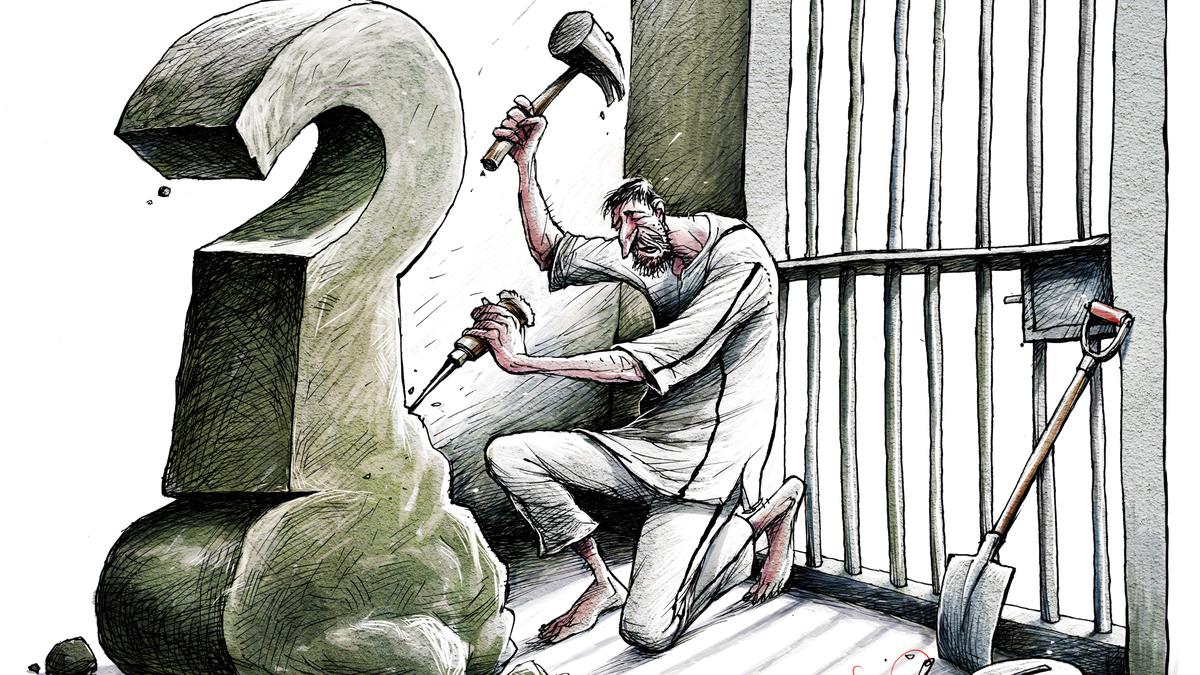
Right to wages behind bars: paid labour lies at the heart of the prison reform system but wages are far below the minimum in nearly every State
The Hindu
Paid labour lies at the heart of the prison reform system but wages are far below the minimum in nearly every State. And, with a lack of adequate training or reskilling opportunities, life after release can be a challenge for most prisoners.
It was a jet black Jaguar one week, a Mercedes the next; sometimes, a drive within the city or a cross-country trip to Goa. Surender Singh was 27, working for a private cab service, doing what he loved — driving. His days were spent ferrying magistrates and lawyers around the city but the nights he reserved for his friends.
“We were a large group of friends who were into bikes and cars. Some of them were dancers. And at night, I would use my friends’ bikes for stunts. They would bet on me,” he says. Born into a cross-cultural home — with a father from Delhi and mother from Tamil Nadu — Singh had just got married and had his first child. “I stopped the stunts after a few accidents. I just kept my head down and got more driving work and soon I started driving people across the country,” he continues. “I also liked to sing, and had started scoring gigs at local pubs or neighbourhood functions. Beyond that, the memory fades a little. It was 10 years ago.”
Singh is sitting at a cafe in West Delhi, a month after being released from jail on permanent bail. He is wearing a crisp white shirt, tucked into a pair of jeans, and is sporting a black cap. He takes a deep breath, as if in preparation to talk about the worst decade of his life — the time he spent inside Tihar Jail on murder charges in a road rage case.
“The first two months, I was asked to sweep the prayer field, clean the toilets, mop the floor, and so on. It took me a while to find the rhythm of the prison,” says Singh, explaining how he worked through the various departments at Tihar Jail No.1. “It did not really seem like work until I started needing the money to send back home.” That’s when Singh realised that as an undertrial, he had to write to the prison authorities asking to be put on the payroll. “I submitted the papers, and earned a little over ₹2,000 the first time. It took a while for the money to start coming in, however. The first few years, the wages would be staggered and we would get the accumulated amount only every other month,” he recalls, his smile fading away.
India’s roughly 1,400 prisons house 5.73 lakh inmates (as of 2022), over 75% of whom are undertrials. All of them have, at some point during their time inside, worked in one capacity or the other, irrespective of whether or not they were paid for it. This is despite the landmark Supreme Court judgment from 1998 that states no inmate can be put to work without pay.
In addition, the Model Prison Manual, 2003, which is the guiding principle for prison management in India, stipulates that “the salaries given to workers should not be minimal or trifling, but rather fair and equitable. These rates, which must be paid to employees, must be standardised and frequently changed in compliance with government notices clarifying/ changing the appropriate minimum wages”. And, it is up to the individual State governments to fix minimum wages for prison inmates based on their broad classification as skilled, semi-skilled, or unskilled workers.
As of 2022, in at least 14 States and Union Territories, the minimum prison wage for skilled work is set at less than ₹100 per day. Thus, a convict in Maharashtra, Goa, Haryana or Assam earns just about ₹70 (average) a day for skilled work, while his counterpart in Delhi’s Tihar Jail makes between ₹194 (unskilled) and ₹308 (skilled). For comparison, the regular minimum wages in the Capital are ₹495 and ₹600, respectively; it is ₹307 and ₹417 in Goa; and ₹292 and ₹338 in Haryana.





















 Run 3 Space | Play Space Running Game
Run 3 Space | Play Space Running Game Traffic Jam 3D | Online Racing Game
Traffic Jam 3D | Online Racing Game Duck Hunt | Play Old Classic Game
Duck Hunt | Play Old Classic Game











